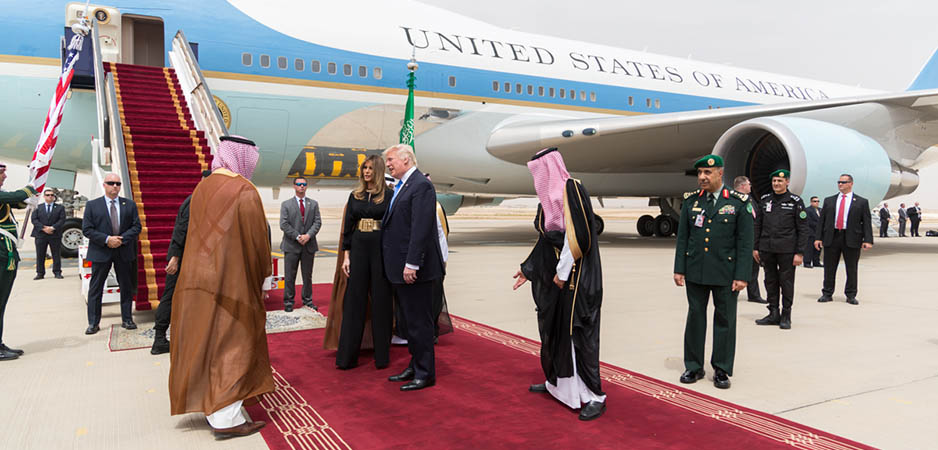Mike Pompeo wants to make sure we don’t forget which team America supports in the Middle East. The Daily Devil’s Dictionary explains.
As the world awaits the “severe punishment” Donald Trump intends to mete out to Saudi Arabia and his friend Mohammed bin Salman (MBS), the US appears to be preparing the case for the defense of the beleaguered crown prince. Trump sent Secretary of State Mike Pompeo to Saudi Arabia and Turkey as chief detective to gather evidence, but has not been forthcoming about what evidence he has amassed. He prefers looking at the bright side of things as we learn from ABC News: “Pompeo also stressed the ‘long strategic relationship’ that the U.S. has with Saudi Arabia, and described the country as an ‘important counter-terrorism supporter.’”
Here is today’s 3D definition:
Supporter:
A spectator given to vocally encouraging another team out of blind loyalty but who can have no direct influence on the result of the contest
Contextual note
Pompeo’s message is clear and it rests on two arguments. The first is that a “long strategic relationship” should be prolonged. It’s the logic of history. No isolated incident should be permitted to disturb it. The second is the logic of contemporary history established by George W. Bush. We are in a global war on terror, which means any nation that supports the noble American cause of counterterrorism should be rewarded rather than punished.
This of course flies in the face of what many commentators have noted: That Saudi Arabia has distinguished itself more as a supporter of terrorism than of counterterrorism. Many Americans may remember a date in their history now referred to simply as 9/11. But the expertly designed communication policy of the Bush administration at the time managed to convince many of those same Americans that the engineer of that shameful attack was in Baghdad and that the key to counterterrorism was regime change in Iraq.
This had the advantage of engaging American troops in several Middle Eastern countries, ultimately providing new opportunities to develop the nations’ counterterrorism technology and skills, as the particularly brutal terrorism of of the Islamic State exploded as a reaction to the American presence.
Historical note
Former US Ambassador Gary Grappo, underlining Pompeo’s logic, remarks that “America, as the indispensable ally of the kingdom, holds the upper hand.” He describes Saudi Arabia as being “of vital strategic importance to the US.” But he wonders at the same time whether the Trump administration understands how to use that leverage, which would “require a type of diplomacy not yet seen in this administration.”
Secretary of State Mike Pompeo returned last night from Saudi Arabia and Turkey. I met with him this morning wherein the Saudi situation was discussed in great detail, including his meeting with…
— Donald J. Trump (@realDonaldTrump) October 18, 2018
We might, on the contrary, ask ourselves, as Major Danny Sjursen has, whether a relationship that is “indispensable” for Saudi Arabia is also indispensable for the US. “In the cynical past,” Sjursen writes, “the U.S. could at least argue that it needed Saudi oil, but that’s no longer the case, due to the shale-oil boom (though that fact is not necessarily good for an ever-warming planet).”
He also points out that “Riyadh’s regional policy is utterly counterproductive to U.S. interests.” But that depends on how “interests” are defined. If the interest of the US is — as it seems to be for President Trump, John Bolton, MBS and Benjamin Netanyahu — the outcome of regime change in Iran, then it couldn’t be considered counterproductive. But the soldier-historian Sjursen has a vivid memory of what the same logic produced in Iraq in 2003 when the clique of neocons around Bush, Dick Cheney, Donald Rumsfeld and Paul Wolfowitz believed in the golden opportunity of taking over Iraq’s oil-based economy.
There are two other matters to consider, both of which can be summed up by the same word: dollar. Trump has repeatedly insisted that in punishing Saudi Arabia, however severely, the US mustn’t punish itself by renouncing the $110 billion commitment to a defense contract he is so proud to have negotiated. A murderous regime needs murderous equipment, and they would only buy it elsewhere if we refused to provide it. And Saudi money spent on weapons means jobs in the US, whose manufacturing has now — as Sjursen points out — become concentrated on military weaponry. We need the money, Trump has been telling us, to keep the economy running.
For decades, Saudi Arabia has provided the basis for a massive military presence in the entire Arabian Peninsula. This in fact was the very pretext cited by Saudi citizen Osama bin Laden to found al-Qaeda, who objected to the American occupation of his home country.
The other link with the dollar itself. With the various changes taking place across the globe, including the rise of the Chinese economy, the dollar has been losing steam as the premium reserve currency. Some say it is threatened. In July, Reuters informed us that: “The U.S. dollar’s share of currency reserves reported to the International Monetary Fund fell in first quarter of 2018 to a fresh four-year low, while euro, yuan and sterling’s shares of reserves increased, according to the latest data from the International Monetary Fund.” But Saudi Arabia’s “currency is pegged directly to the U.S. dollar” and will continue to be so long as the “long strategic relationship” remains in place.
*[In the age of Oscar Wilde and Mark Twain, another American wit, the journalist Ambrose Bierce, produced a series of satirical definitions of commonly used terms, throwing light on their hidden meanings in real discourse. Bierce eventually collected and published them as a book, The Devil’s Dictionary, in 1911. We have shamelessly appropriated his title in the interest of continuing his wholesome pedagogical effort to enlighten generations of readers of the news.]
The views expressed in this article are the author’s own and do not necessarily reflect Fair Observer’s editorial policy.
Support Fair Observer
We rely on your support for our independence, diversity and quality.
For more than 10 years, Fair Observer has been free, fair and independent. No billionaire owns us, no advertisers control us. We are a reader-supported nonprofit. Unlike many other publications, we keep our content free for readers regardless of where they live or whether they can afford to pay. We have no paywalls and no ads.
In the post-truth era of fake news, echo chambers and filter bubbles, we publish a plurality of perspectives from around the world. Anyone can publish with us, but everyone goes through a rigorous editorial process. So, you get fact-checked, well-reasoned content instead of noise.
We publish 2,500+ voices from 90+ countries. We also conduct education and training programs
on subjects ranging from digital media and journalism to writing and critical thinking. This
doesn’t come cheap. Servers, editors, trainers and web developers cost
money.
Please consider supporting us on a regular basis as a recurring donor or a
sustaining member.
Will you support FO’s journalism?
We rely on your support for our independence, diversity and quality.






